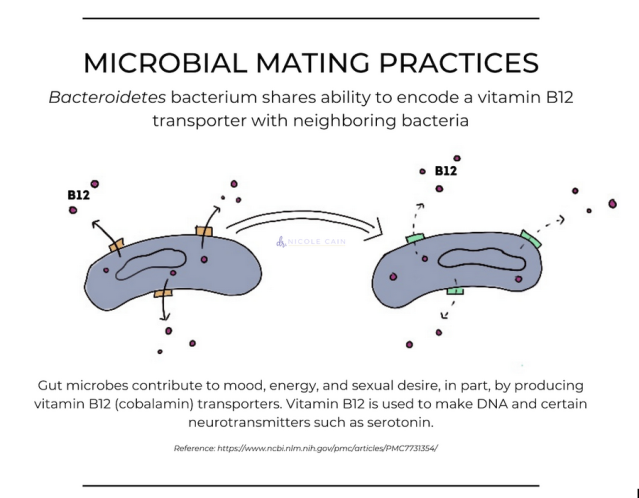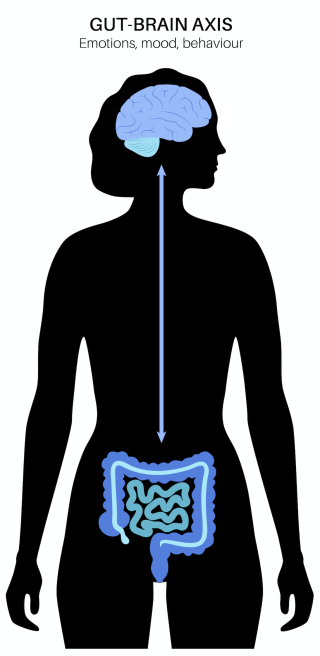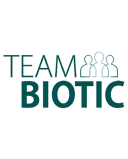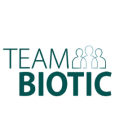Sex
Sex and Your Gut: Libido
3 life hacks for bolstering sexual function and libido.
Posted January 16, 2023 Reviewed by Hara Estroff Marano
Key points
- The gut-sex connection involves hormones, vitamins, mood, and more.
- The Red Queen hypothesis explores the co-evolution of our gut bugs and our sex drive.
- Gut microbial diversity is key to a fulfilling sex life.
- With a few simple measures, you can support your gut's microbial diversity.
By: Nicole Cain, ND, MA
Recent research links the gut microbiome to sex drive and satisfaction. How did our bugs get into our sexual health in the first place?
In the early nineteenth century, human sexual behavior was defined by moralists and legal authorities, with the majority of theory and research emphasizing sexual disease and deviancy.1 It was not until Dr. Alfred C. Kinsey, trained as an entomologist and zoologist, applied the scientific method to the study of human sexuality in the mid twentieth century that a more robust scientific foundation was attempted
By the second half of that century, physicians, psychiatrists, and other clinicians were building a literature that became the springboard for one of the dominant theories about how and why humans and microbes have much to do with each other sexually: the Red Queen hypothesis.2
The Red Queen hypothesis takes its name from Lewis Carroll's book Alice Through the Looking Glass, in which the Red Queen explains how her country differs from Alice's: "Now, here, you see, it takes all the running you can do, to keep in the same place. If you want to get somewhere else, you must run at least twice as fast as that!" It's an evolutionary theory that explains that human beings and their resident microbes, in their competition for resources, drive the evolution of each other. The theory asserts that in the co-evolution between us and our bugs, our bugs support successful sexual relations leading to mutually beneficial reproduction.

How does this work in practice? Findings from a groundbreaking 2021 study in the journal Cell Reports3provide a suggestion. Researchers report that “the functional and genomic diversity of the human gut microbiome is shaped by horizontal transfer of mobile genetic elements (MGEs).” In essence, microbes have sex in order to swap genetic material, an essential act for both bacterial and host survival and evolution.
An example of bacterial sex can be found in the human gut microbe Bacteroidetes sharing its ability to encode an essential vitamin B12 transporter with another microbe via horizontal gene transfer. In a 2022 article published in Science Alert4, authors describe one example by which a bacteria equipped with B12-transporting genetic material is able to transfer its genetic material to a neighboring bacteria. B12 nourishes the brain and nervous system, supports endothelial health of sex organs—including those necessary for a healthy erection5—and enhances sensitivity and pleasure sensations of genital nerves5, all of which are important players in a healthy sex life.
Strategies to Leverage the Gut-Sex Connection to Improve Your Sex Life

Although the relationship between sexual desire/function and the human microbiome is complex and multifactorial, there are a number of mechanisms by which it may regulate sexual health.6 And these sex-drive-boosting hacks can help keep the system running smoothly:
- Increase Gut Microbial Diversity
Research suggests6 that one of the most important steps you can take in getting your sex life on track is to increase your gut microbial diversity toward a balanced microbiome.
Three primary strategies are recommended:7 probiotics, fermented foods, and fiber.
- Probiotics
A probiotic formulation should undergo rigorous analyses including human trials to establish clinical efficacy. Consider an evidence-based probiotic that is formulated with microbial diversity in mind.
An example of such evidence can be found in a recent study8 where investigators conducted a systematic investigation of the GI tract before and after a four-week treatment with a probiotic formulation. They assessed the mucosal immune system, microbiome diversity, short chain fatty acid production, and mucosal permeability.
- Fermented Foods
An additional strategy is consumption of fermented food. A clinical trial9 published by Stanford Medicine reports fermented foods bolster libido-supportive microbial diversity. Consider adding foods such as kimchi, sauerkraut, and miso to your diet.
- Fiber
Lastly, ensure that there is plenty of fiber in your diet10, because it supports the good gut bacteria allowing for beneficial species to thrive. Dietary fiber also maintains bowel health, aids in hormone balancing, and supports detoxification. Think broccoli, lentils, whole grains, and apples. Prebiotic supplements including inulin, chicory, and oligosaccharides (GOS, FOS) can also play a role.
2. Optimize Hormones
Hormonal health is foundational for a healthy, satisfying sex life. Sexual desire is typically higher in men than in women, with testosterone thought to account for this difference.11 Testosterone requires methylcobalamin (vitamin B12) to form.12 Therefore, B12 deficiency may result in a corresponding dip in testosterone and libido. Moreover, estrogen and testosterone tend to oppose each other. When estrogen levels become proportionally higher than testosterone, libido may suffer. To date, identification of strategies to reverse conversion of estrogen back into testosterone is limited. However, exciting new research13 suggests that certain gut bacteria are able to correct overconversion of estrogen back into libido-boosting testosterone.
Estradiol → CDMS → 1-dihydrotestosterone (1-DHT)
3. Emotional relationship with sex
Your mood, emotional well-being, and feelings of connectivity are important aspects of a healthy sex drive. And don't forget: mood is significantly influenced by the microbiome and gut-brain-targeted probiotics (psychobiotics).14
“People with depression ... feel badly about themselves and might view their partners through a negative filter, all of which impacts sex drive.”15
References
1. The Kinsey Institute. https://kinseyinstitute.org/about/history/alfred-kinsey.php Accessed 12Jan23.
2. Ma ZS (2022) Microbiome Transmission During Sexual Intercourse Appears Stochastic and Supports the Red Queen Hypothesis. Front. Microbiol. 12:789983. doi: 10.3389/fmicb.2021.789983
3. Frye, K.A., Piamthai, V., Hsiao, A., & Degnan, P.H. (2021). Mobilization of vitamin B12 transporters alters competitive dynamics in a human gut microbe. Cell reports, 37, 110164 - 110164.
4. Cassella, C. There's a bunch of bacteria having sex in your gut and it's wilder than we thought. Science Alert. Feb 2022. https://www.sciencealert.com/there-are-a-bunch-of-bacteria-having-sex-i… Accessed 12Jan23.
5. Wolffenbuttel BHR, Wouters HJCM, Heiner-Fokkema MR, van der Klauw MM. The Many Faces of Cobalamin (Vitamin B12) Deficiency. Mayo Clin Proc Innov Qual Outcomes. 2019 May 27;3(2):200-214. doi: 10.1016/j.mayocpiqo.2019.03.002. PMID: 31193945; PMCID: PMC6543499.
6. Li G, Li W, Song B, Wang C, Shen Q, Li B, Tang D, Xu C, Geng H, Gao Y, Wang G, Wu H, Zhang Z, Xu X, Zhou P, Wei Z, He X, Cao Y. Differences in the Gut Microbiome of Women With and Without Hypoactive Sexual Desire Disorder: Case Control Study. J Med Internet Res. 2021 Feb 25;23(2):e25342. doi: 10.2196/25342. PMID: 33629964; PMCID: PMC7952237.
7. Woods, B, Why Everyone Needs a Probiotic. https://www.omnibioticlife.com/does-everyone-need-probiotics/ Accessed 12Jan23.
8. Moser, A.M., Spindelboeck, W., Halwachs, B. et al. Effects of an oral synbiotic on the gastrointestinal immune system and microbiota in patients with diarrhea-predominant irritable bowel syndrome. Eur J Nutr 58, 2767–2778 (2019). https://doi.org/10.1007/s00394-018-1826-7
9. Weaver, J. Fermented-food diet increases microbiome diversity, decreases inflammatory proteins, study finds. Stanford Medicine News Center. Jul 2021. https://med.stanford.edu/news/all-news/2021/07/fermented-food-diet-incr… Accessed 12Jan23
10. Cain, N. Digestive Upset. https://drnicolecain.com/digestive-upset/ Accessed 12Jan23
11. van Anders SM. Testosterone and sexual desire in healthy women and men. Arch Sex Behav. 2012 Dec;41(6):1471-84. doi: 10.1007/s10508-012-9946-2. Epub 2012 May 3. PMID: 22552705.
12. Wang PH, Chen YL, Wei ST, Wu K, Lee TH, Wu TY, Chiang YR. Retroconversion of estrogens into androgens by bacteria via a cobalamin-mediated methylation. Proc Natl Acad Sci U S A. 2020 Jan 21;117(3):1395-1403. doi: 10.1073/pnas.1914380117. Epub 2019 Dec 17. PMID: 31848239; PMCID: PMC6983444.
13. Wang PH, Chen YL, Wei ST, Wu K, Lee TH, Wu TY, Chiang YR. Retroconversion of estrogens into androgens by bacteria via a cobalamin-mediated methylation. Proc Natl Acad Sci U S A. 2020 Jan 21;117(3):1395-1403. doi: 10.1073/pnas.1914380117. Epub 2019 Dec 17. PMID: 31848239; PMCID: PMC6983444.
14. Bagga D, Reichert JL, Koschutnig K, Aigner CS, Holzer P, Koskinen K, Moissl-Eichinger C, Schöpf V. Probiotics drive gut microbiome triggering emotional brain signatures. Gut Microbes. 2018 Nov 2;9(6):486-496. doi: 10.1080/19490976.2018.1460015. Epub 2018 Jun 14. PMID: 29723105; PMCID: PMC6287679.
15. Payne, J. Low Sex Drive-Could it be a Sign of Depression? Johns Hopkins Medicine. https://www.hopkinsmedicine.org/health/wellness-and-prevention/low-sex-…. Accessed 12Jan23.




